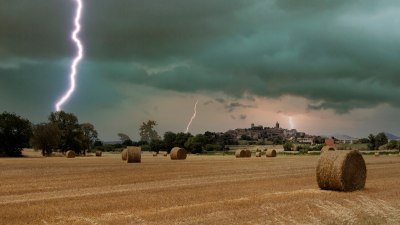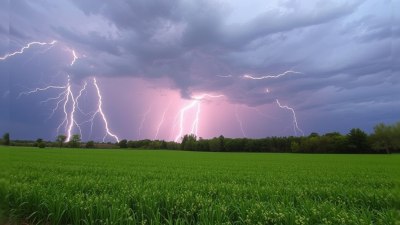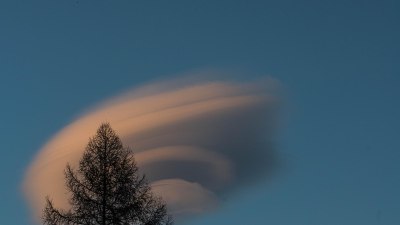What If the Moon Controlled the Weather Instead of the Tides
Explore a fascinating scenario where the Moon influences weather patterns instead of ocean tides.

This image was created with the assistance of DALL·E
Throughout history, the moon has held a prominent place in human culture, mythology, and science. Traditionally recognized for its influence on tides, the Moon’s gravitational pull is a key factor in the rise and fall of ocean levels. However, what if we lived in a world where the Moon governed the weather instead of just the tides? This hypothetical scenario presents an intriguing exploration of the potential implications and dynamics involved in such a phenomenon.
First, let’s consider the mechanics of such a system. The idea revolves around the Moon’s gravitational forces affecting atmospheric pressure and weather patterns rather than merely the bodies of water on Earth. Scientists understand that the Moon's distance from Earth generates a pull on water bodies, leading to tides. If this gravitational pull were redirected towards the atmosphere, it could create significant changes in weather systems, possibly causing more pronounced seasonal variations and extreme weather events.
The Moon’s Influence on Weather Dynamics
The basic principle behind the Moon’s effect on weather would rely on its gravitational pull creating shifts in atmospheric pressure. These shifts could result in changes in wind patterns, altering the way storms develop and travel. For example, hurricanes might shift directions or change intensity based on the Moon’s cycle, creating a direct link between lunar phases and storm development. The gravitational pull could increase wind speed and introduce more humidity to the atmosphere during the full moon, leading to heavier rainfall and potentially more severe weather conditions.
Furthermore, if the Moon were to influence weather in this manner, we could expect changes in seasonal weather patterns. Each lunar cycle could dictate specific weather phenomena, so that certain weeks of the month would be characterized by specific weather. The first quarter might signal wet conditions, while the last quarter could bring dry spells. This predictability could help farmers, meteorologists, and everyday folks better prepare for the weather!
Historical Context and Cultural Reflections
While the concept of the Moon controlling weather is purely hypothetical, it's worth noting that various cultures have revered the Moon as a deity associated with fertility, agriculture, and life cycles. Many ancient societies based their calendars on lunar phases, and agricultural practices were often tied to the lunar calendar. In a reality where the Moon controlled weather, these cultural connections might strengthen, leading to a resurgence of lunar-based agricultural practices, rituals, and celebrations.
Farmers could begin to use the patterns dictated by lunar cycles to optimize planting and harvesting. Crop yield could be enhanced, depending on how farmers adapt their practices around lunar weather forecasts, further intertwining agriculture and culture with the lunar calendar. The importance of lunar festivals might evolve, celebrating the full moon's anticipated rainfalls or drought periods with community rituals and gatherings.
Potential Impacts on Biodiversity
The hypothetical Moon-induced weather changes would also create exciting challenges for biodiversity. Many species have adapted to the current climate and ecosystems, which might shift unpredictably under lunar control. Some species could thrive with changes in seasonal patterns, while others might struggle to adapt, facing threats of extinction or requiring migration to new habitats. Birds, insects, and other creatures reliant on specific weather conditions for mating, feeding, or migration patterns would undoubtedly experience disruptions.
The delicate balance of ecosystems could be further impacted as changes in precipitation and temperatures drive shifts in habitat conditions. For example, tropical rainforests might flourish under increased rains, while desert ecosystems may face challenges if excessive moisture leads to changes in soil composition and plant life. Ecosystems worldwide must be carefully studied to understand how interdependencies may shift with lunar weather control.
Human Adaptation and Technological Innovations
In a world where the Moon controls the weather, human society would need to adapt significantly. New technologies could emerge to predict lunar weather changes accurately, allowing societies to develop defenses against potentially severe weather events. This might lead to advancements in weather forecasting technology, including algorithms and machine learning models that specifically analyze lunar cycles.
Infrastructure might also evolve to withstand new weather patterns. Cities designed to manage excessive rainfall or increased flooding risks would become necessary. Flood defenses could take inspiration from tidal control mechanisms used today, but refined to handle the moisture-laden storms predicted by lunar systems.
Global Cooperation and Environmental Responsibility
When the Moon becomes pivotal in regulating weather patterns, societies might need to foster greater cooperation on a global scale to manage these changes. Natural disasters influenced by lunar weather controls could lead to new international agreements for disaster response, climate adaptation strategies, and resource sharing in the event of food shortages due to extreme weather shifts.
The need for responsible stewardship of the environment may also gain momentum as communities experience the impact of the Moon’s influence. With more volatile weather patterns potentially altering ecosystems, humans would have to confront their role in climate change and environmental degradation more urgently. Thus, a shift toward sustainability could become paramount—one fueled by the pressing awareness that the stability of weather systems ties to a celestial body.
Conclusion: A Lunar Legacy
The exploration of a world where the Moon controls the weather instead of the tides presents intriguing perspectives on our relationship with nature and the cosmos. From the influence on weather phenomena to cultural reflections, biodiversity, technology, and the potential for cooperative global action, the hypothesis underscores the interconnected nature of our world. As we continue to navigate the complex dynamics of planetary systems, the Moon’s allure, impact, and significance remain ever-relevant.
The very thought of the Moon guiding our weather—with all its implications—invites us to consider not only how we engage with natural phenomena but also how we might adapt, innovate, and cultivate resilience in a changing environment. Through curiosity and imagination, we can explore new realms of thought where celestial bodies entwine with life on Earth, reminding us of our place within the universe.











